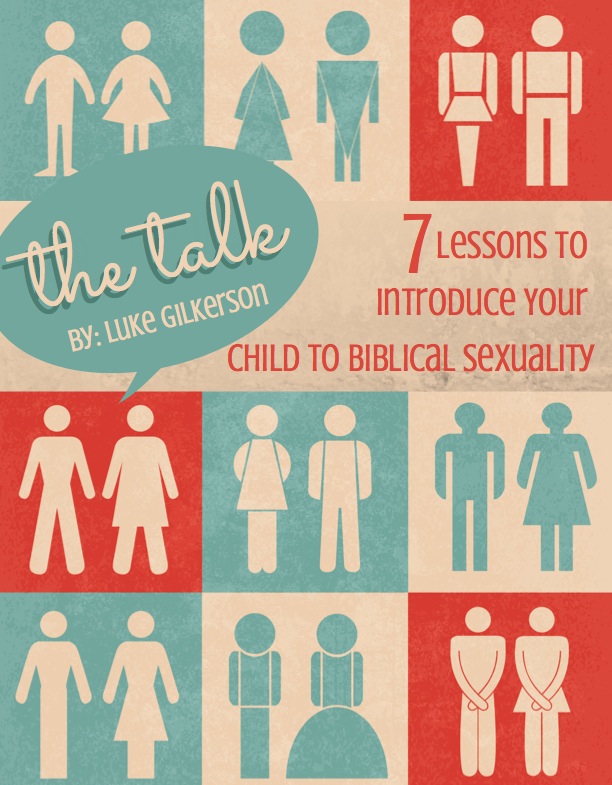Talking to their kids about lust and pornography feels daunting for many parents. And these topics are secondary to a more foundational discussion of sex. Parents who are fearful of talking to their kids about sex leave a void of silence the world—especially pornography—will be glad to fill.
The problem is, many parents are too afraid to talk to their kids about sex because they don’t want to say “too much too soon.” Unfortunately, “too much too soon” often turns into “too little too late.”
When Should You Have “The Talk”?
First, it is worth saying that teaching kids about sex is a lot like teaching them about anything: It involves not just one conversation but a series of ongoing conversations—some of them formal, some informal.
So, when I say “the talk,” I’m not describing the one and only time you talk to your kids about sex—heaven forbid. I’m talking about the moments when you describe, for the first time, key aspects of what sexuality is all about: what sexual intercourse is, how babies are made, the differences between male and female reproductive organs, and God’s rules about sexuality. These initial “downloads” of information can take place in one discussion or a series of discussions, but they should always be followed with more conversations.
Between birth and age five, there are plenty of initial conversations parents can have with their kids.
- During these ages, children are very concrete and literal, so it is a perfect time to teach the proper names of body parts (especially their own parts).
- In addition, as small children grow, they should be taught about the importance of modesty and privacy.
- Most importantly, during these years, parents should establish a rhythm of family devotions. Call this routine whatever you like: family worship, Bible time, family prayer, etc. This is a perfect time for kids to get used to seeing Mom or Dad open the Scriptures to talk about the things that really matter. This will establish the Bible as the authority on all matters of life and establish you as the teacher.
Generally speaking, between the ages of six and ten, parents should begin having lengthier discussions with their kids about sex. There are many reasons for this.
- The age of six marks the beginning of major social shifts as children spend more time around their peers at school. It is in these peer settings that children begin to gravitate toward same-sex friendships and develop an interest in gender differences. Schools and other peer groups are also where children most commonly hear misinformation about sex. There’s also a risk of exposure to pornography. Children as young as six are coming home from the playground talking about having boyfriends and giving “blow jobs.”
- Around the age of six or seven, a child’s intellectual capacities begin to change. At this age, a child can begin to distinguish between their own thoughts and the thoughts of others. They begin reasoning with imagination and logic. They have an incredible thirst for knowledge about the universe “out there.” This makes having discussions with them about detailed subjects much easier.
- Physically speaking, between the ages of six and eight, the adrenal glands begin to mature. During this stage, dehydroepiandrosterone (DHEA) is secreted by the adrenal cortex. The metabolizing of DHEA leads to both testosterone and estradiol—the primary sexual steroids in men and women. Then, at age 10, DHEA levels increase significantly—about 10 times the amount a child has at age four. Several independent studies now say that 10 years old is the average age of first sexual attraction for both boys and girls.
- Sadly, children are becoming more and more aware of sex from unwanted sources. According to our own list of pornography statistics, 51% of boys and 32% of girls see porn before their teenage years. Children are also most vulnerable to sexual abuse between the ages of 7 and 13. Of all victims of sexual assault reported to the police, 34% are under the age of 12.
So, use these elementary school years to talk to your kids about God’s plan for sexuality. Do it before the world does and when their minds are ripe to absorb it.
How Should You Have “The Talk”?
My recommendation is this: Let the Bible break the ice for you.
- First and most importantly, the Bible provides children and adults alike with a foundation for how to grasp the subject of sexuality. There is no better source of information about sex and no better place to lay the groundwork for our understanding.
- Second, if your children are already accustomed to you turning to the Bible day after day to give them formative instruction, then turning to biblical passages about sex will seem natural to them. Plus, this method reinforces the idea that sex is not in a special category that is outside the scope of God’s interest. Sex is not a taboo subject that God is embarrassed about; rather, sex is something that is part of the good world God created.
- Third, using the Bible to break the ice also takes the edge off the conversation for parents and kids. If family Bible discussions are already par for the course, then cracking open the Bible to talk about sex won’t feel like a serious or grave conversation.
A Sex Ed Family Bible Study
Luke Gilkerson has written a sex ed conversation guide for Christian families called The Talk: 7 Lessons to Introduce Your Child to Biblical Sexuality. In this study, Luke uses Bible passages he considers foundational texts that help to lay a groundwork when talking to kids about sex.

- Genesis 1:24-27 – “God created them male and female” – This text is a great launching pad for conversations about what makes boys and girls different.
- Genesis 1:28-31 – “Go forth and multiply” – This text provides and great place to start talking about how babies are conceived and what sexual intercourse is.
- Psalm 139:13-18 – “Wonderfully made” – What does it mean that God knits us together in our mother’s wombs? This text provides parents a great place to talk about how babies grow and develop in utero.
- Genesis 2:18-25 – “The two shall become one flesh” – Sex is also about intimacy and there’s a reason why it should be reserved for marriage. This text is a great launching pad for that discussion.
- Exodus 20:14 – “You shall not commit adultery” – Going right back to the Ten Commandments we see the prohibition against adultery. This provides kids with an understanding about why adultery is an offense to God.
- 2 Samuel 13:1-14 – “Do not violate me” – It is important to talk to kids about the possible threat of sexual abuse and rape, and this story provides and opportunity to discuss it.
- 1 Corinthians 6:18-20 – “Bought with a price” – In the end, sex should be understood in the light of the gospel. Why do we honor God with our bodies? Because even our bodies were bought with a price.
When I was asked to edit this study when it was still in draft form, I immediately knew our members needed to hear about it. This publication has all the talking points you need. The introduction for parents alone is worth the read. Using these seven lessons will provide your children with a legacy of value in their present and future relationships.










I’m very grateful about what you are doing, all your advise are very helpful to me. I’m a father of seven years old boy who started developing interest in sex, and when he was interviewed he said he learn it from class mates in school, we talked to him about God that He hate such, prayed for him and change his school but he has not really changed.
Please what do I need to do next?
Hi James!
Thank you for reaching out. It seems like you are taking the right steps to protect your son. As parents, we are able to place boundaries around our kids, but we cannot change their hearts. Since your son is young, continue to put rules and guidelines into place for him, but ultimately, pray for him. Let him know that you are going to be there for him, no matter what – that you will love him.
I encourage you to download our ebook, Connected.
Blessings,
Moriah
Hello,
I really have my hands full my daughter is only 13 and is having sexual verbal textex messages with her boyfriend. I am trying to handle this without blowing up in jist rage. They have been together for 2 years and i think hearing things from school is pushing this issues trying to be cool. I want to handle this and stop this immediately.
Thanks for all letters that I read I learn a lot how to talk to my children a bout sex and our body
I am glad I stumbled on this . The follow up questions and answers are very insightful and detailed. I am a Teen Sexuality Coach and there are few resources both online and offline that seem to talk about sexuality from a Christian perceptive and in a detailed way such that parents and teen teachers can be properly guided. Well don’t Chris on your answers. There are few of such positive teachings in my country and our teenagers are scaringly growing so fast. Thanks Kay for the links . I have saved them . God bless you.